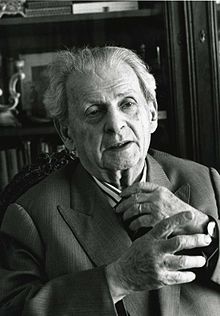
Back Emmanuel Levinas Afrikaans إيمانويل ليفيناس Arabic ايمانويل ليفيناس ARZ Еманюел Левинас Bulgarian Emmanuel Levinas Catalan Emmanuel Levinas Czech Emmanuel Levinas Danish Emmanuel Levinas German Εμανυέλ Λεβινάς Greek Emmanuel Levinas Esperanto
Emmanuel Levinas | |
|---|---|
 | |
| Born | Emmanuelis Levinas 12 January 1906, O.S. 30 December 1905 |
| Died | 25 December 1995 (aged 89)[2] Clichy, France |
| Education | University of Freiburg (no degree) University of Strasbourg (Dr, 1929) University of Paris (DrE, 1961) |
| Era | 20th-century philosophy |
| Region | Western philosophy |
| School | Continental philosophy Existential phenomenology[1] Jewish philosophy |
| Institutions | University of Poitiers University of Paris University of Fribourg |
Main interests | Ethics · metaphysics · ontology · Talmud · theology |
Notable ideas | "The Other" · "The Face" |
Emmanuel Levinas[3][4] (/ˈlɛvɪnæs/; French: [ɛmanɥɛl levinas];[5] 12 January 1906 – 25 December 1995) was a French philosopher of Lithuanian Jewish ancestry who is known for his work within Jewish philosophy, existentialism, and phenomenology, focusing on the relationship of ethics to metaphysics and ontology.
- ^ Andris Breitling, Chris Bremmers, Arthur Cools (eds.), Debating Levinas’ Legacy, Brill, 2015, p. 128.
- ^ Bergo, Bettina, "Emmanuel Levinas", The Stanford Encyclopedia of Philosophy (Summer 2015 Edition), Edward N. Zalta (ed.), URL = <https://plato.stanford.edu/archives/sum2015/entries/levinas/>.
- ^ L'anachronisme constitutif de l'existence juive – Nonfiction.fr: "Première remarque, sans doute à l'humour décalé : l'auteur de ces lignes a toujours entendu Emmanuel Levinas réclamer que l'on écrive son nom correctement, c'est-à-dire sans accent." Larousse.fr also employs the non-accented form.
- ^ Another form of the surname is Lévinas according to Levinas.fr, Universalis.fr and Britannica.com.
- ^ The pronunciation is the same whether the name is written Levinas or Lévinas.
© MMXXIII Rich X Search. We shall prevail. All rights reserved. Rich X Search